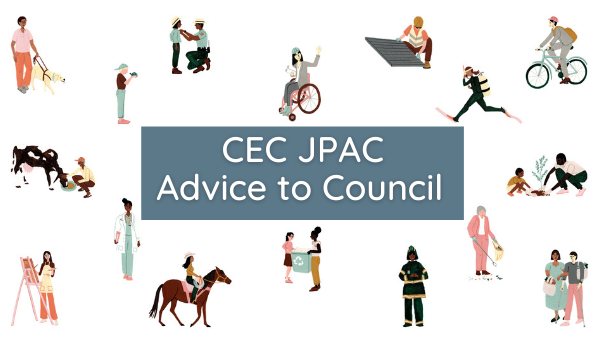Joint Public Advisory Committee Submits Advice to Council of North America’s Environment Ministers
The Advice Results from JPAC’s Public Consultation on the CEC’s Five New Trilateral Projects
Montreal, 20 July 2021—The Commission for Environmental Cooperation’s (CEC) Joint Public Advisory Committee (JPAC) has submitted new advice to the CEC Council, stemming from an online public consultation in May and June 2021 on the CEC’s five new trilateral projects.
“The advice that JPAC submitted to the CEC Council reflects our profound commitment to facilitating deep public engagement with North America’s top environment officials on many of our most critical environmental challenges. Recognizing our shared responsibility for ensuring the quality of our environment, including our air, food and water, is of the utmost importance,” said Dr. Pedro Moctezuma Barragán, 2021 JPAC Chair and esteemed Mexican economist and academic.
The JPAC Chair is elected for a one-year term and rotates among Canada, Mexico and the United States. Dr. Moctezuma’s experience includes leadership on water, environment and community issues, and he has published more than 60 academic books and papers.
Following each public consultation, JPAC provides advice to the CEC Council, which includes Canada’s Environment Minister Jonathan Wilkinson, Mexico’s Secretary of the Environment and Natural Resources María Luisa Albores González, and US Environmental Protection Agency Administrator Michael Regan.
The 2021 Advice to Council contains the following overarching recommendations, noting that as appropriate, all projects should:
- Include representatives from Indigenous Peoples and seek to integrate traditional ecological knowledge (TEK) in project elaboration and implementation;
- Consider potential impacts of climate change as part of their assessment and during the elaboration of tools and solutions;
- Involve collaboration with all relevant stakeholders, including representatives from the private sector, to provide a fuller picture of existing initiatives, issues and challenges which will support the elaboration of comprehensive solutions and leveraging of resources to maximize the impact of projects;
- Elaborate extensive education and outreach campaigns to raise awareness on the issues being tackled by the projects and disseminate potential solutions, including individual actions that can be taken to address them;
- Review the scope and budget of the projects to ensure that they are sufficient to achieve the stated objectives.
JPAC is composed of nine citizen volunteers (three from each country) and advises the Council on any matter within the scope of the Environmental Cooperation Agreement, which entered into force on July 1, 2020. JPAC meets throughout the year in different North American locations, typically in conjunction with CEC events.
If you would like to know more about CEC initiatives, you can sign up for our newsletter and follow us on social media.

About the CEC
The Commission for Environmental Cooperation (CEC) was established in 1994 by the governments of Canada, Mexico and the United States through the North American Agreement on Environmental Cooperation, a parallel environmental agreement to NAFTA. As of 2020, the CEC is recognized and maintained by the Environmental Cooperation Agreement, in parallel with the new Free Trade Agreement of North America. The CEC brings together a wide range of stakeholders, including the general public, Indigenous people, youth, nongovernmental organizations, academia, and the business sector, to seek solutions to protect North America’s shared environment while supporting sustainable development for the benefit of present and future generations
The CEC is governed and funded equally by the Government of Canada through Environment and Climate Change Canada, the Government of the United States of Mexico through the Secretaría de Medio Ambiente y Recursos Naturales, and the Government of the United States of America through the Environmental Protection Agency.